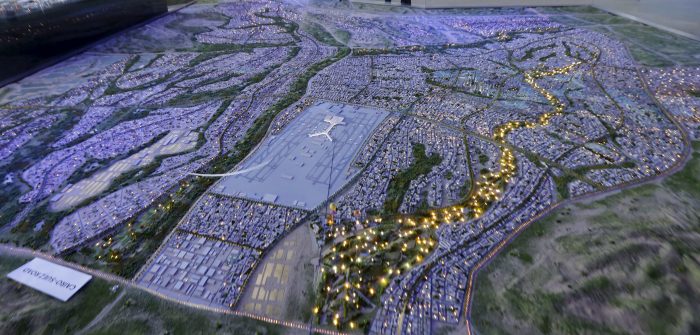The Desert, a Resource Curse
Could land be Egypt’s Dutch Disease?

A model of a planned new capital for Egypt, Sharm El-Sheikh, March 28, 2015. Amr Abdallah Dalsh/Reuters
For nearly thirty years, Egypt’s hopes for economic growth, development, and social progress hung on the promise of planned new cities built out in the desert, miles away from heavily populated towns and cities clustered around the Nile Valley. For David Sims, the author of Egypt’s Desert Dreams, which chronicles the history of this state-led project, Egypt continues to pursue—and fail to deliver on—this vision of desert cities as a panacea.
At an AUC lecture, Sims posited that Egypt cannot achieve its “dreams of modernity.” To begin with, its new cities will never keep up with population growth. In 2017, the population of the new towns accounted for only 3.8 percent of Egypt’s total population increase. Even if the rate of redistribution into the new cities goes up to 10 percent in the next ten years, that will hardly have an effect on overpopulation along the Nile River.
Nonetheless, the government continues to invest in a host of new cities and industrial zones across the country. Some seventeen new towns have been launched or decreed since 2016, six of which—covering a total expanse of 500 square kilometers—are extensions to existing areas. Of the stand-alone new towns, Sims noted that New Alamein is the only one witnessing development, and this only on its ten kilometers of coveted Mediterranean coastline. “This shows that development in the new towns has become completely commodified. It is a financial issue—this is why I think it continues.”
Selling and redeveloping land for private money is a profitable safe haven for family wealth. With prices for a few plots of land in one of Cairo’s suburbs rising from 4,500 Egyptian pounds in 2009 ($818 at the time) to 55,000 ($3,143 today) per square meter, Sims gave as an example, investing in housing is lucrative for both buyers and sellers, including the Housing Ministry and even the Armed Forces.
As for the New Administrative Capital—a megaproject announced in 2015 and planned east of Cairo—Sims was skeptical it would succeed. According to Sims, the city’s “eastward expanse takes the Dubai model to the extreme.” It is seen as a vehicle for investment and a way to reform government—and isolate it. Even at 14 square kilometers and larger than built-up Cairo, at least half the land allotted for the “new capital,” if not more, has been sold.
However, the investment model on which building the city rests is not too sound, said Sims. Hopes for the new capital to become a city-state, business-friendly, international destination and tax haven like Dubai will never happen. That is because Egypt does not have limitless funds to draw from—Gulf handouts are not significant, and the Chinese are unwilling to fund their investment with anything but advanced loans, which Egypt would have to pay back, he added. Turning to the other half of Egypt’s desert ambitions—planned industrial zones— Sims also found the government’s efforts misplaced. “Most of these are unsuitable, poorly serviced and largely empty.” By focusing on allocating even more land in the desert for industrial use, he said, Egypt was failing its nascent manufacturing sector and, in many ways, putting the cart before the horse.
While the government has taken admirable steps to improve the environment for small and medium enterprises or SMEs, Sims said these also fall victim to the “obsession with infinite space.” For example, he noted that virtually all areas which have been sanctioned for small industries (where SMEs work) are in remote industrial and logistics zones or new towns—again, an issue of access. “Egypt should be using its advantage—cheap, relatively educated labor. But these places are just too far away from population centers. Two to four hours per day commuting for a job that’s horribly underpaid [does not work].” The focus on creating these industrial spaces, he added, crowds out other, more effective industrial policies that would boost employment and the sector as a whole.
Seeing the desert as a dangerous mirage for urban development, Sims concludes with a question: can the land curse be as debilitating and rent-creating as a natural resources curse?
Leslie Cohen is deputy senior editor at the Cairo Review of Global Affairs.
Read More


